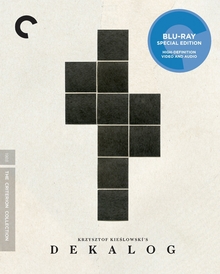Dekalog
| Dekalog | |
|---|---|

Blu-ray box set cover
|
|
| Directed by | Krzysztof Kieślowski |
| Produced by | Ryszard Chutkowski |
| Written by | Krzysztof Kieślowski Krzysztof Piesiewicz |
| Starring |
Artur Barciś see below |
| Music by | Zbigniew Preisner |
| Cinematography | Wieslaw Zdort Piotr Sobociński |
| Edited by | Ewa Smal |
|
Production
company |
|
| Distributed by | Warner Bros. (Poland) |
|
Release date
|
|
|
Running time
|
572 minutes |
| Country | Poland |
| Language | Polish |
| Budget | $100,000 (all parts) |
| Box office | $447,093 |
Dekalog (pronounced [dɛˈkalɔg], also known as Dekalog: The Ten Commandments and The Decalogue) is a 1989 Polish television drama series directed by Krzysztof Kieślowski and co-written by Kieślowski with Krzysztof Piesiewicz, with music by Zbigniew Preisner. It consists of ten one-hour films, inspired by the Ten Commandments. Each short film explores one or several moral or ethical issues faced by characters living in an austere apartment block in modern Poland.
The series is Kieślowski's most acclaimed work, has been said to be "the best dramatic work ever done specifically for television" and has won numerous international awards, though it was not widely released outside Europe until the late 1990s. Filmmaker Stanley Kubrick wrote an admiring foreword to the published screenplay in 1991.
Though each film is independent, most of them share the same setting (a large housing project in Warsaw), and some of the characters are acquainted with each other. The large cast includes both famous actors and unknowns, many of whom Kieślowski also used in his other films. Typically for Kieślowski, the tone of most of the films is melancholic, except for the final one, which, like Three Colors: White, is a black comedy, and features two of the same actors, Jerzy Stuhr and Zbigniew Zamachowski.
The series was conceived when Krzysztof Piesiewicz, who had seen a 15th-century artwork illustrating the Commandments in scenes from that time period, suggested the idea of a modern equivalent. Krzysztof Kieślowski was interested in the philosophical challenge and also wanted to use the series as a portrait of the hardships of Polish society, while deliberately avoiding the political issues he had depicted in earlier films. He originally meant to hire ten different directors, but decided to direct the films himself, though using a different cinematographer for each with exception of episodes III and IX, both of which used Piotr Sobociński as director of photography.
...
Wikipedia
